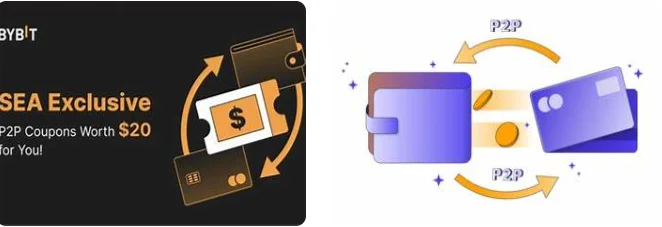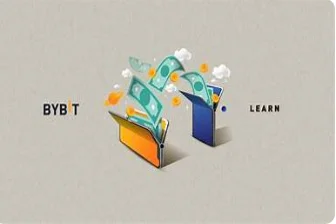P2P Trading: What It Is and How to Make Money
P2P trading (peer-to-peer) is the crypto-native way of swapping assets directly with other users — no banks, no centralized exchange middlemen, no gatekeepers. Unlike centralized exchanges (CEX), where every trade goes through the platform’s engine, in P2P you set your own terms, negotiate with real people, and execute trades wallet-to-wallet with an escrow layer for protection.

That freedom is why P2P is blowing up: you can profit from price gaps across platforms (crypto arbitrage) or by charging fees when setting up deals. Think of it as crypto hustling with leverage on market inefficiencies.
Platforms like Bybit P2P add a security layer with an escrow system — your coins get locked until both sides confirm the deal. That means less risk, more trust, and more upside if you know how to ride the volatility.
- What P2P trading really means in crypto
- Ways to profit: arbitrage, commissions, spreads
- Key advantages of going P2P
- Risks + pro tips for safe trading
P2P Trading on Bybit: How to Start & Bank Gains
Bybit isn’t just a top-tier exchange for futures degens — it’s also one of the most liquid P2P crypto marketplaces. On Bybit P2P, you can buy or sell Bitcoin, Ethereum, USDT, and other popular tokens directly with other traders. No hidden spreads, no waiting — just instant deals secured by escrow. All you need: a Bybit account, a verified profile, and a few bucks to start flipping.

The biggest edge? Bybit locks the funds until both parties deliver. That means no rug, no scammy ghosting. For beginners, the interface is clean and intuitive, but pros can go deeper — running arbitrage loops or stacking commission gains.
- How to start trading on Bybit
- Unique features of Bybit P2P
- Escrow-backed deal security
- Profit strategies for P2P on Bybit
Step-by-Step: How to Trade P2P on Bybit

- Create a Bybit Account. Jump to the official Bybit site, sign up with email + password, confirm via link, and boom — you’re in.
- KYC Verification. For safety and liquidity access, upload your ID and complete video verification. It boosts trust and keeps scammers out.
- Fund Your Wallet. Deposit crypto directly, or load fiat through P2P deposits. Pick your method, get funds on the account, and you’re ready to trade.
- Pick a Listing. Go to P2P marketplace, filter offers by price, volume, payment method. Choose a buyer or seller that fits your play.
- Execute the Trade. Hit “Buy” or “Sell.” Escrow holds the funds until both sides confirm. Simple, trustless, secure.
- Withdraw Your Profit. Once the deal’s closed, move crypto to your wallet or cash out to your bank.
How to Make Money With P2P: Insider Alpha

Making real money in P2P trading comes down to strategy + discipline. The classic play is arbitrage: buy low on one exchange, sell high on another. The second stream? Fee farming — set attractive buy/sell ads, skim small percentages across volume, stack steady gains.
Pro tip: always watch volatility. Crypto moves fast, and spreads can vanish in seconds. Stick to trusted hubs like Bybit where the escrow keeps funds safe, and scale your positions slowly.
- Arbitrage = high risk, high reward
- Commissions = passive stacking
- Always track BTC/ETH/USDT volatility
- Stay liquid and adapt
Comparison: P2P vs CEX vs DEX
| Feature | P2P Trading | CEX (Centralized Exchange) | DEX (Decentralized Exchange) |
|---|---|---|---|
| Middleman | No intermediaries, just escrow | Yes, exchange controls trades | No, smart contracts handle swaps |
| Flexibility | Custom terms, direct deals | Fixed fees, limited control | Protocol-defined, some slippage |
| Profit Potential | Arbitrage & fees on spreads | Trading fees & leverage | Yield farming & liquidity provision |
| Risks | Scams (mitigated by escrow) | Exchange hacks, withdrawal freeze | Smart contract bugs |
FAQ: P2P Crypto Trading
- What is P2P trading in crypto? Direct person-to-person exchange of crypto assets, usually with escrow protection.
- How do I make money? Arbitrage between exchanges or by setting commission-based offers.
- Is P2P safe? On trusted platforms like Bybit, yes — escrow locks funds until both sides deliver.
- What’s the difference vs a CEX? CEX trades are custodial. P2P trades are direct and flexible.
- Can beginners start P2P trading? Absolutely — Bybit has tutorials, clean UI, and built-in guides to help rookies scale.
Final Alpha:
P2P trading isn’t just swapping coins — it’s a whole business model inside crypto. Arbitrage, commissions, spread-hunting: it’s a playground for hustlers who study market flows. If you’re serious, start with Bybit P2P, learn the ropes, and level up from side hustle to full-stack crypto income.
Disclaimer
P2P crypto trading involves financial risk. Prices of Bitcoin, Ethereum, USDT, and other digital assets are highly volatile and may result in partial or total loss of funds. This article is for educational and informational purposes only — it is not financial advice. Always do your own research (DYOR) and consult with a licensed financial advisor before making investment or trading decisions. Bybit and other platforms mentioned here may not be available in all regions, including certain US states. Trade responsibly.